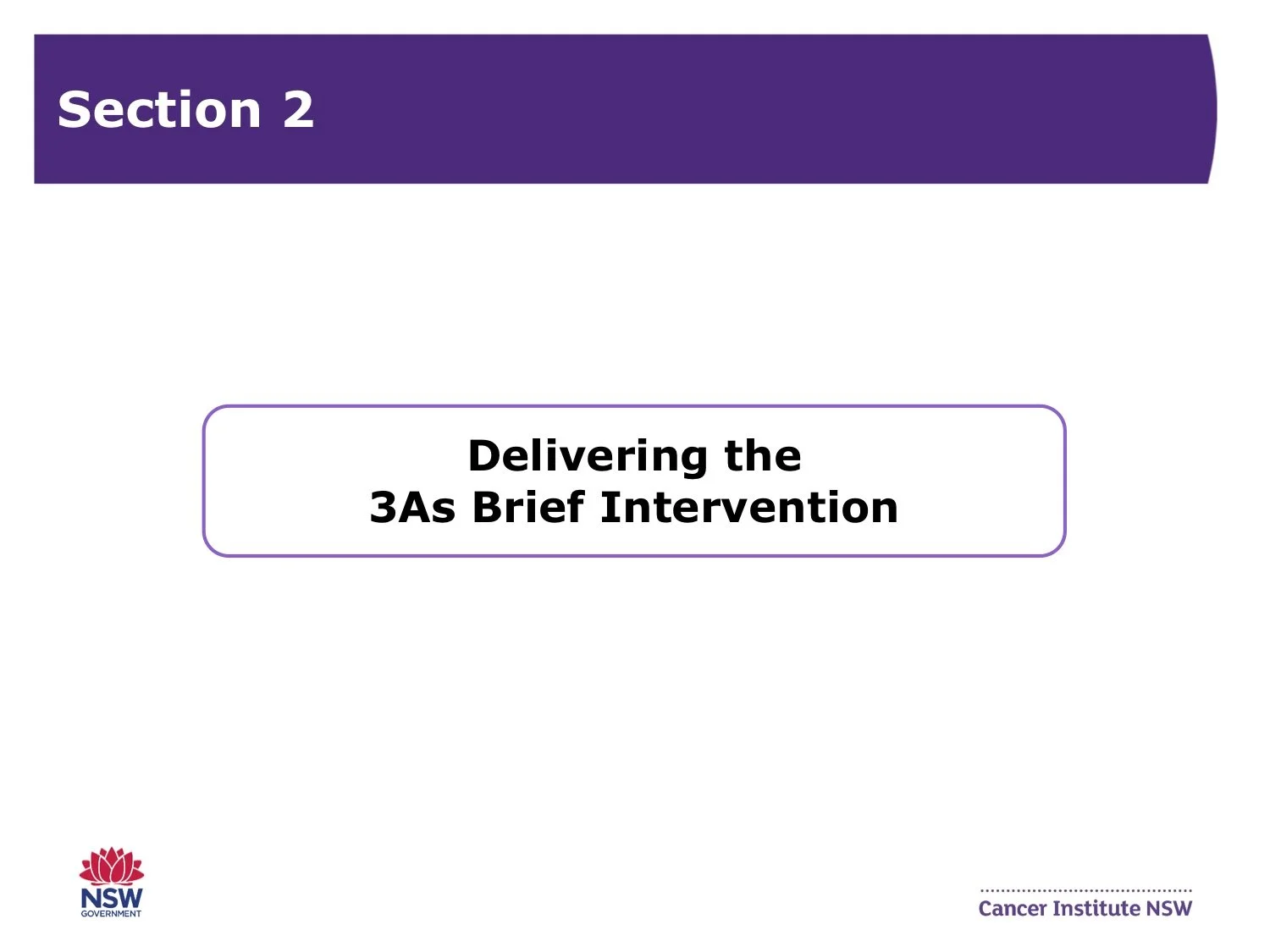Why provide smoking cessation to cancer patients?
Smoking cessation contributes to improved prognosis, reduced treatment toxicities and improved
quality of life for people with cancer.
Asking patients about their smoking status, recording it in the medical record/patient file, advising patients that quitting is important for their cancer treatment, and making a referral for further support (Quitline, NRT or pharmacotherapy) can be done in a few minutes, via the Ask – Advice – Act model of care.
The following provides the reasons and evidence for the importance of smoking cessation care with oncology patients.
Jump to:
PowerPoint Presentations
-

Smoking Cessation in Cancer Services - Training (CINSW)
Why deliver smoking cessation interventions to people with cancer?
-

Smoking Cessation in Cancer Services - Training (CINSW)
Delivering the 3As Brief Intervention
-

Smoking Cessation in Cancer Services - Training (CINSW)
How to ask patients about cessation using AAA model
-

Smoking Cessation in Cancer Services - Training (CINSW)
Step 2: Advise
-

Smoking Cessation in Cancer Services - Training (CINSW)
Step 3: Act, NRT, and routine referral to Quitline
Videos
2014 Surgeon General’s Report – brief conclusions (1:43min; CINSW resource)
Oncologist Prof Graham Warren presents report findings:
Causal relationship between cigarette smoking and increase risk of secondary primary cancers
Quitting reduces overall mortality rates
Tobacco use has a negative association with at least one outcome (e.g. survival, toxicity) across tumour streams*
*lung, head/neck, breast, gyne, hematologic, genitourinary non-prostate, prostate cancers
Cessation impacts lung, breast, and prostate patients (1:21min; CINSW resource)
Presented by oncologist Prof Graham Warren:
Cause of death by cancer has higher hazard ratios for current smokers (prostate example)
Cessation benefits overall mortality for lung and breast cancer patients
Treatment Failure and Cost (1:34min; CINSW resource)
Presented by oncologist Prof Graham Warren:
1st line cancer treatment failure is high for current smokers (e.g., 795 patients in NSW annually)
Financial costs are high for 1stline failure
Number Needed to Treat (1:59min; CINSW resource)
Presented by oncologist Prof Graham Warren:
The Number Needed to Treat (NNT) is the number of patients you need to treat to prevent one additional bad outcome (e.g., death)
The number needed to treat for smoking is estimated 3-5 (means you need to treat 5 people who smoke to prevent one additional bad outcome)
USA Prof Graham Warren interview: Tobacco in Cancer Treatment Outcomes (1:22min; CINSW resource)
Interview with oncologist Prof Graham Warren:
Smoking in cancer patients increases mortality
Decreases chance of 1st line treatment success
Smoking decreases effectiveness of radiation and all chemotherapy for all cancers (Head & neck, lung, breast, prostate, colon)
Australian Oncologist personal opinion about smoking cessation (2:03min; C2Q resource)
Oncologist Dr Fiona Day describes her experience of patient reactions to starting a conversation around smoking cessation
Australian Nurse opinion about smoking cessation (2:17min; C2Q resource)
Nurse Anne Mellon describes her role in assisting patients in quitting and experience with patients
Australian Radiation Therapist opinion about smoking cessation (1:29min; C2Q resource)
Radiation therapist Manning Carey describes his role in assisting patients in quitting, his approach, and experience with patients
Rapid Learning: eVIQ overview of smoking cessation in oncology settings (1:50 min)
Quick infographic video overview of why, how and what smoking cessation services are available
View Here: https://education.eviq.org.au/rapid-learning/archive/smoking-cessation
Factsheets
-

The clinical case for smoking cessation in cancer care (CINSW)
Benefits of smoking cessation in cancer
Negative treatment outcomes if smoking
AAA module and further advise
-

Smoking Cessation in Oncology (eviQ)
Pharmacotherapy
Benefits to patients when quitting
Risks to patients if they keep smoking
5A Model
-

WHO Tobacco and Cancer Treatment Outcomes knowledge survey
Evidence on tobacco use
Impact on treatment outcomes
